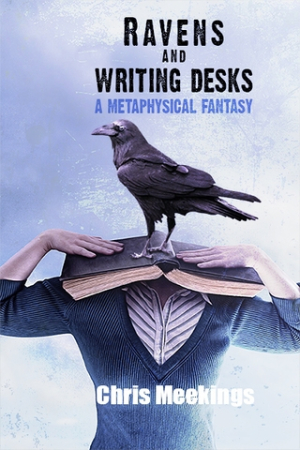
Ravens and Writing Desks
A Metaphysical Fantasy
This novel dives into fantastic worlds of magic, power, and the never-ending fight between darkness and light.
A young girl must battle danger and darkness to fulfill a prophesy in Chris Meekings’s Ravens and Writing Desks, a twist on the classic coming-of-age story that combines elements of famous woman-fronted legends with metaphysics and psychology.
Lucy is thirteen and a bullied bookworm. Intelligence and resourcefulness are qualities that don’t seem to count for much in her school. With no real friends, her father dead, and her grandfather recently injured, she feels alone in a world that doesn’t understand her. A new world opens up to Lucy, though—one in which a magician claims that she is the prophesied hero of the land.
The only trouble is that Lucy can’t tell the difference between fantasy and reality, as her awareness shifts back and forth between the magical realm and a hospital setting. Is she really a powerful warrior fighting to save a dying dimension, or is she having a mental breakdown after a traumatic event? Many times throughout the novel, Lucy herself comes close to breaking the fourth wall, or realizing her fictional essence. Lucy’s character is developed in some ways, as with her love of reading, but is left lacking in others, like her early life, other hobbies and interests, and other details that might make her more relatable and engaging.
Lucy’s plight draws heavily on the hero’s journey story format and will be familiar to anyone who grew up with book characters as their best friends. Her urge to escape the mundane and cruel real world and disappear into a realm of magic and mystery is sympathetically rendered. As Lucy undertakes her epic quest to save a magical land, she notices that many of the creatures and situations bear a resemblance to the stories that she’s read, including Alice in Wonderland, the Narnia books, and The Wizard of Oz.
Indeed, Ravens and Writing Desks is a love letter to these books; even Lucy’s full name, Lucy Alice Zara Gayle, is a combination of characters from woman-centric stories. Avid fantasy fans will have fun recognizing the heavily referenced material throughout the novel.
However intentional, that so many of the characters and ideas are derivative becomes tiresome. There are places where the text drags noticeably, and even the characters are aware that the story is stalling. When there are original concepts or characters, many of them are left as unfinished plot devices, like Lucy’s potential love interest and her grandfather’s injury.
The text keeps its audience guessing, blending magic and metaphysics to lend credibility to all possibilities. The descriptions of Lucy’s adventures are creative and compelling, using interesting analogies to create emotional connection, while keeping with the strange language found in Alice in Wonderland.
Ravens and Writing Desks dives into fantastic worlds of magic, power, and the never-ending fight between darkness and light in which fans of fantasy, science fiction, and classic stories will find both familiar faces and new concepts.
Reviewed by
Delia Stanley
Disclosure: This article is not an endorsement, but a review. The publisher of this book provided free copies of the book and paid a small fee to have their book reviewed by a professional reviewer. Foreword Reviews and Clarion Reviews make no guarantee that the publisher will receive a positive review. Foreword Magazine, Inc. is disclosing this in accordance with the Federal Trade Commission’s 16 CFR, Part 255.
